#adventure time analysis
Text

Something I’ve often found really compelling in Adventure Time is how The Grass Sword/Grass Demon/Fern found up becoming one of the most prominent and disturbing antagonists of the series pretty much by complete accident.

Like it’s easy to forget after Fern has become such a prominent character both in the show and fandom, but the ‘curse’ of the Grass Longsword started out and spent much of the show entirely benign. All it really did was cause the sword to stick to Finn. If anything, the sword/curse was quite beneficial to Finn, providing him with a prosthetic arm and activating on several instances to protect him. Really, the entire point of the original Blade of Grass episode was that the sword was actually pretty useful.

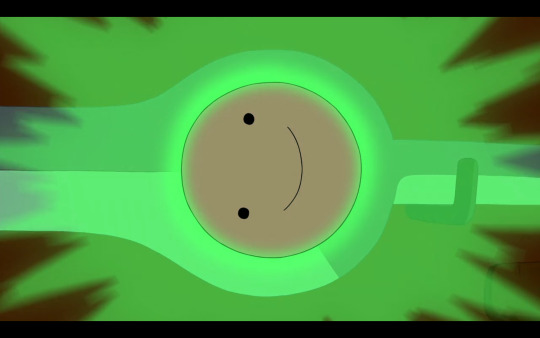
It was only AFTER stabbing and later merging with the Finn Sword to create Fern that the ‘curse’ started becoming actively malicious.
In hindsight, I think it’s pretty clear that while the Grass Spider/Octopus/Demon ‘curse’ entity within the Grass Sword may have been malicious, for the longest time it had no way of actually controlling or otherwise influencing Finn. The sword may have bonded to Finn’s body, but NOT to his mind, or more importantly his soul. This left Finn free to use the sword, and later even the grass-prosthetic freely without any danger or corruption from the curse.
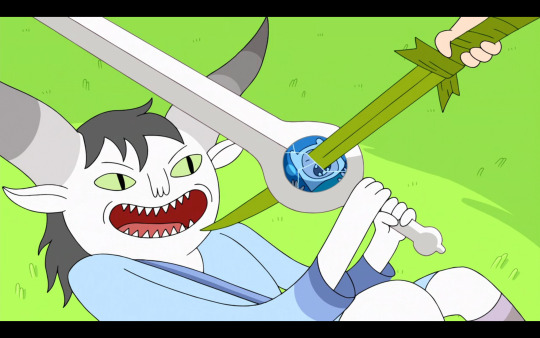

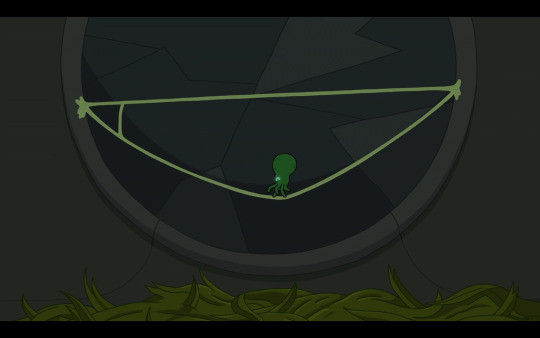
But then Finn accidentally used it to stab the Finn Sword. As we see in Two Swords, this for the first time gave the Grass Demon/Curse direct access to a soul, the soul of the alternate Finn within the Finn Sword. A soul that it was able to corrupt and influence and ultimately merge with to create Fern.


This is one of those things that I think a lot of the fandom seems to miss: Fern isn’t some quirky doppelganger or a ‘brother’ to Finn. He is straight up a distorted, corrupted version OF Finn (the alternate iteration of him within the Finn Sword) manifested by the CURSE of the Grass Sword.
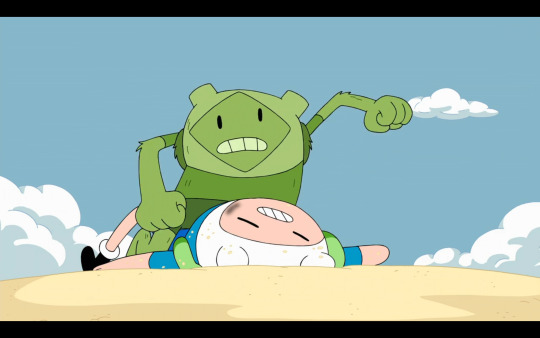
As in, basically EVERYTHING Fern does that deviates from the ‘norm’ that is Finn can be considered the work OF the curse. From more overt stuff like his tendency to ‘stab first, ask questions later’ or the times he ‘flips out’, to more subtle things like his brooding or just the fact that he has a noticeably different voice (the voice of the Grass Demon mind you), ALL of these are the product of the Curse.

And it’s this fact which makes Fern a truly tragic character. Because he was effectively doomed from the very start. Despite Fern’s attempts to do good and Finn’s and Jake’s attempts to accept him as his own person, Fern simply could not escape the curse’s influence. Because that curse was the very thing that created and maintained his physical body. It WAS his body. And this curse wanted nothing but to subvert, influence and ultimately CONTROL him for its own ends.
I think we can very easily assume that all of Fern’s failures, all his insecurities, everything that drove him to turning on Finn and trying to kill him and becoming the Green Knight in the final season, ALL of that was the result of the curse’s influence. Trying to whittle and break down Fern’s will so that it could mold him into whatever it wanted. And there was NOTHING Fern could do to stop this. Because the curse made itself a core part of what he was.
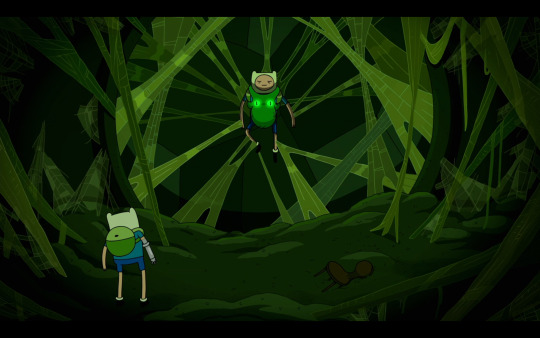

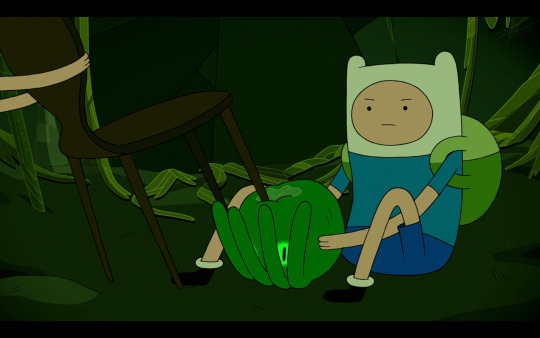
When Finn and Fern finally enter his mental world and destroy the Grass Demon in Come Along With Me, we see Fern as he truly is: simply another version of Finn who has been corrupted by the curse.

And with the Grass Demon dead, there is nothing to maintain Fern’s physical body, causing him to soon fade away. In order for this alternate Finn to be saved, he couldn’t exist as ‘Fern’.

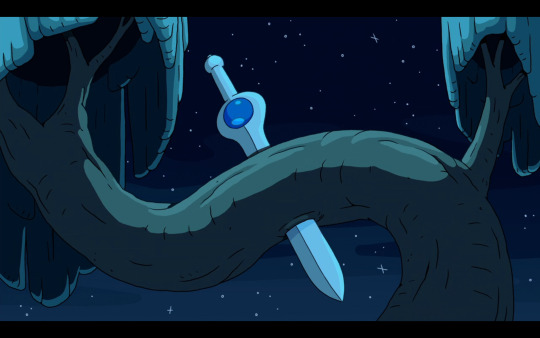
Of course this also means that ‘Fern’ didn’t actually DIE at the end of the series. He simply reverted back to his true form: The Finn Sword.

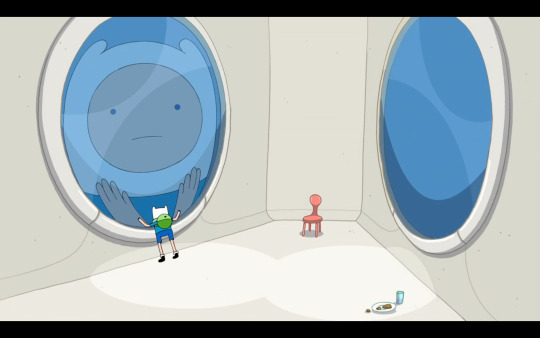
And what I find so compelling and tragic about all this is that NONE of it had to actually happen. The Finn within the Finn Sword didn’t need to be put through all this suffering. Like it seems pretty clear that the Finn that become the Finn Sword was perfectly content being a sword. He didn’t need to be corrupted and spend the last two and half seasons being manipulated by a grass octopus demon.
Because when you think about it, ALL of this happened by accident. If Finn hadn’t lost the Finn Sword to Bandit Princess, or if he’d been able to simply avoid stabbing it with the Grass Sword during his fight with her, NONE of this would have happened. Finn would still have the Finn Sword and the Grass Sword would have likely remained benign and helpful to him. Heck, given how Finn seems to fully regain the use of the Grass Sword in his fight with Bandit Princess, he probably would have been able to duel-wield the Grass Sword and Finn Sword together.
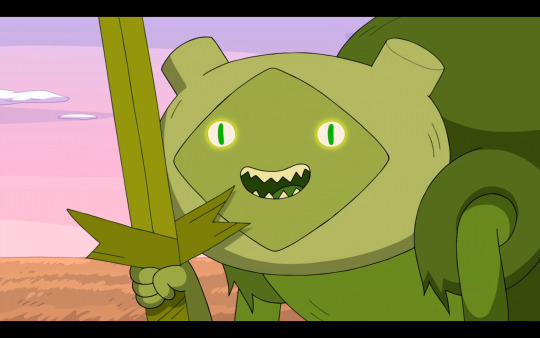


This is really what I find to be the tragedy of Fern: That two of Finn’s greatest tools wound up becoming one of his most dangerous adversaries, and even worse that the Finn who became the Finn Sword was tortured and corrupted for no real reason, all essentially by accident.
#adventure time#adventure time analysis#finn mertens#finn the human#fern the human#the grass sword#the finn sword#now that i think about it calling him 'fern' almost feels insulting#like we insist on calling this finn a name that represents one of the worst times of his life#imagine the au where finn DOESN'T stab the finn sword?
1K notes
·
View notes
Text
Okay, so, I know this is kind of a Stupid Thing to Focus on but… I’ve been rewatching ‘Friends Forever’ (still one of my favorite and most complex and most heart-wrenching Ice King episodes) and I’ve been thinking about the bit where Ice King tries to research how to be smart…
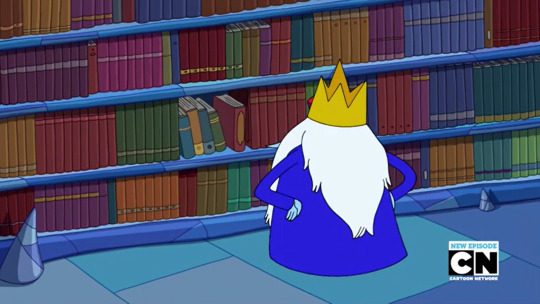
We can see him reads from what very much seems to be part of Simon Petrikov's journals. Considering that it details the aftermath of the Mushroom War.
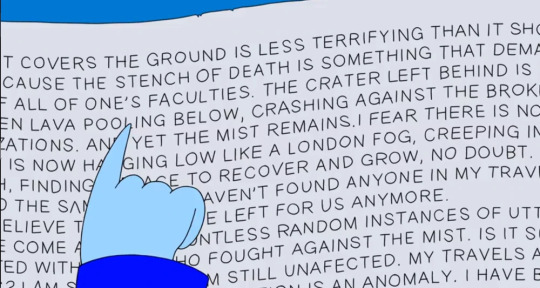
In addition, while the shelves are made of ice, much like the bookshelves Ice King has in his throne room, this is clearly a much... robust archive
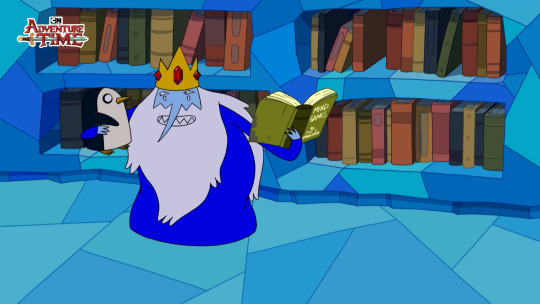
which much more resembles Simon Petrikov’s library/research room.
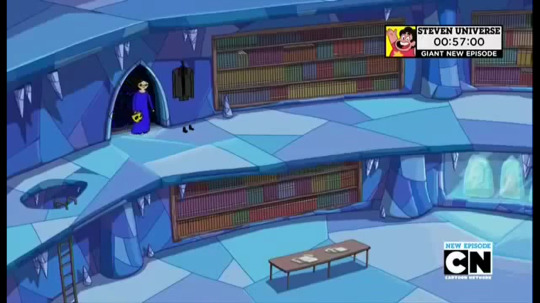
The table IK uses also seems to be a match to the one in the research room. At least in terms of colors
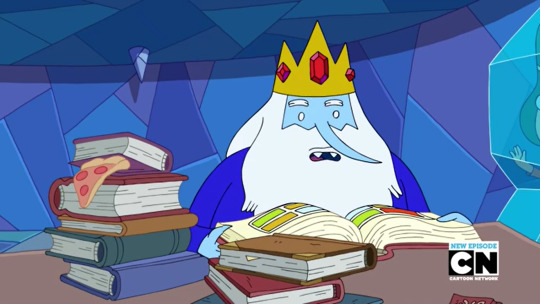
So, it might be a different Room Full of Books that Simon placed in his Castle before he truly 100% lost it, or it might be the same one we see in 'Betty' but with a minor continuity error when it comes to what the shelves are made from. Either way, from the aforementioned journal, we know this library probably contains books Simon had personally written
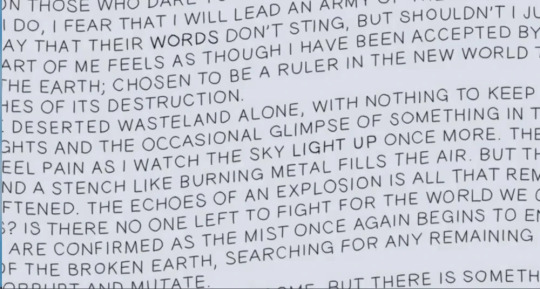
But considering the Amount, probably not all of them. (Especially if you assume there are two separate library rooms). Maybe he came back to his old house to gather up all the prewar academic books he owned, but that still seems like an Unusually High Amount of Books. I think he probably kept gathering and writing books as he was slowly turning into Ice King. Like, by the time the show started he was basically totally gone - but a couple hundred years ago he’d have brief moments of lucidity and start writing again or searching books that could help him deal with the curse.
Which makes me wonder about this book.
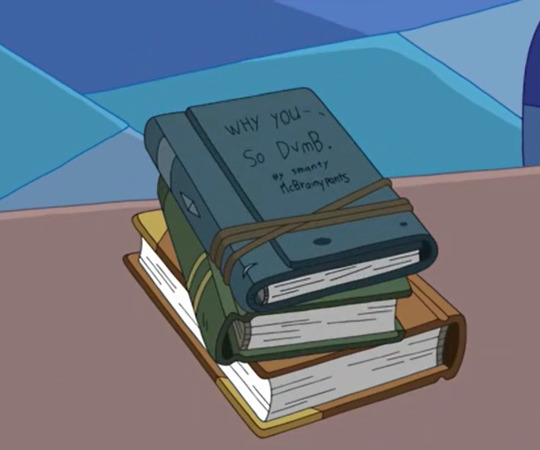
I know that it’s just a silly funny joke, but…
Like, a Big Undertone of ‘Friends Forever’ is Ice King’s insecurities and frustrations with his own stupidity and lack of maturity. And with Simon’s library showing up in the middle of the episode like it did, it’s hard to forget that Simon used to have the intelligence and maturity needed to speak with all of these living furniture on equal terms, but his mental facilities have been eroded by the madness of the Crown and now he can’t and these frustrations manifest even though Ice King isn’t fully aware of that fact.
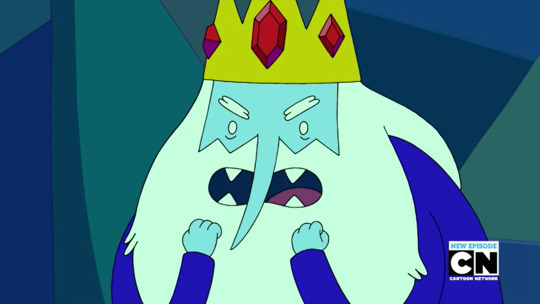
And this book, I know that the title just playing directly into Ice King’s insecurities is just the Joke but also…
I’m thinking about Ice King/Simon when he was a bit more lucid. Aware that he’s going mad and it's getting harder and harder for him to think clearly and that makes it so much harder to find a solution and expressing a lot of that same anger that Ice King expresses outwards towards the Living Furniture - inwards.
I’m wondering if Simon specifically sought out that book because he felt like he was ‘turning dumb’.
I’m wondering if Simon could’ve written this book. Some sort of last final act of impotent rage against the person he was turning into, frustration at his growing inability to think like he used to, even though he couldn't even remember his own name anymore - only that he was the 'Smarty McBrainypants' part of his old identity.
That would explain why it’s such a worn and rugged book...

#adventure time#atimers#adventure time analysis#adventure time headcanons#at#ice king#the ice king#simon petrikov#adventure time ice king#simon adventure time#adventure time simon#at simon
513 notes
·
View notes
Text
i love the contrast between the backgrounds behind magic betty and past betty, past bettys room shows so much personality and life while magic betty stands in front of an empty void - reflective of how much of her identity had become lost after becoming magic and because of her obsession with simon. The comparison between the two backgrounds show so much about what state she is in and it just makes the "i spent so much of my life dedicated to simon, i'm not sure if there's even any 'me' left anymore" line even sadder

#adventure time#betty grof#petrigrof#simon petrikov#adventure time analysis#fionna and cake#magic betty
185 notes
·
View notes
Text
In "Too Young" when Princess Bubblegum talked about how she "never get to act like a kid" and how she wishes she "could stay like this with you, but..." I started crying. This poor girl grew up in the harsh world of early Ooo, she spawned from a living wad of gum and built a house for her brother, she tried to have a family but they betrayed her and she internalized that as "ignorance is bliss." Because shes intelligent, and she's sure not happy, and they were intelligent, and they weren't happy either, atleast Neddy is happy when he's just sucking on those roots and blissfully unaware of his surrondings. Homegirl didn't have any childhood at all, even Marceline had a more carefree childhood when she was with Simon, and she grew up in the literal apocalypse with three parental abandonments. Simon kept her entertained and cared for her, but PB was protecting Neddy and scavenging for resources, on her own, just to stay alive, her entire childhood. God. People dont talk enough about how tragic her childhood was, I feel freaking awful.
#she just.......she never got to grow up properly#i hope she and marceline get a good 500 years to just be dumb teenagers together because they've both gone through way too much#funnily enough though i feel like the fandom places more emphasis on marceline's suffering probably because it's more relatable#which y'know makes sense I'm not gonna judge anyone for that I love Marceline and her childhood was tragic too.#I once saw someone say that PB living in the Candy Kingdom and Ice King living the Ice Kingdom is for them kind of like living#in their own heads. and. yeah that sums it up to a tea. everyone else go home they explained it perfectly.#poor kiddo#princess bubblegum#bonnibel bubblegum#pb adventure time#simon petrikov#marceline abadeer#adventure time#too young#lemongrab#they make me sad#cryyyyyy#candy kingdom#adventure time analysis#spontaneous analysis
209 notes
·
View notes
Text
That portal looks like a halo or aureola... And he's directly tied with a force of nature who's treated and represented as the devil...
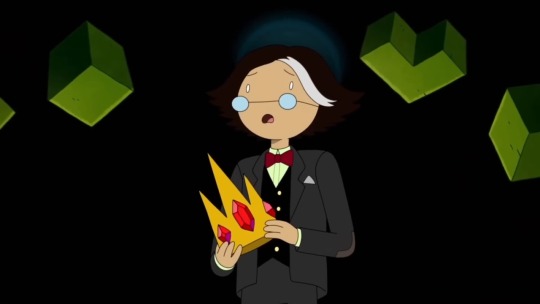
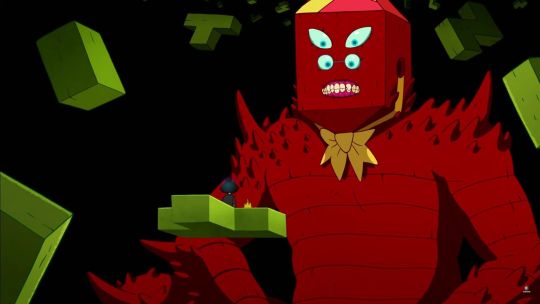
Makes me wonder if there's any correlation between these two, (maybe just GOLBetty tho) and Prismo's boss.

#golb adventure time#golb#golbetty#adventure time#simon adventure time#simon petrikov#adventure time betty#betty grof#betty adventure time#adventure time simon#adventure time analysis#fionna and cake spoilers#fionna and cake#adventure time fionna and cake#adventure time fionna and cake theory#WHO THE FUCK IS PRISMOS BOSS#JUST SHOW THEM GODDAMIT
191 notes
·
View notes
Text
The Crown As a Metaphor For Drug Use
THE PARALLELS
Ice King's Crown, which will be referred to as "the crown" in this post, has many potential interpretations. I've seen people view it as a metaphor for Alzheimer's and/or mental illness in general. I believe there is a strong case for it being a metaphor for drug use, especially with the the information Fionna and Cake give us.
There are a few parallels shown. Throughout Fionna and Cake, Simon's shame of his time wearing the crown is front of center. He tries to avoid thinking about it as much as possible. He threw a little girl's Fionna and Cake book away because confronting his time as Ice King was too much for him. He hates remembering his time as an "insane" man as he put it. We also see that Farm world Finn, despite only being in that state for a few years, is still haunted by his time wearing the crown. This shame is also present in those who have recovered from an addiction to drugs and/or alcohol. Many will feel ashamed of the out-of-character decisions they made when they were under the influence.
Sometimes, when people take large doses of certain kinds of drugs, they can develop "substance induced psychosis" which often involves (typically persecutory) delusions, memory problems, and can involve hallucinations. The crown made Simon insane, but it also made him feel happy all the time, kind of like a high. When he would get bouts of loneliness or other negative feelings, he would quickly forget what made him feel bad in the first place. His thinking was often detached from reality, and he had complete amnesia of who he was before the crown. He had "wizard eyes" that allowed him to see the spirit world, but made it more difficult to parse what was actually going on in his plane of existence. This could be thought of as a metaphor for hallucinations. While the crown isolated him from his loved ones, namely Betty and Marceline, he was able to make other new magical friends (near the end of the show). The same thing happens to addicts when they start using.
MAGIC, MADNESS, SADNESS, AND DRUGS
In season 6 episode 38 You Forgot Your Floaties the concept of "Magic, Madness, and Sadness" is discussed. Essentially, Betty states that she believes each magic user has varying degrees of Magic, Madness, and Sadness. It seems that if a precious magic user loses their Madness or Sadness, they are no longer magical. Magic Man in the same episode could no longer perform Magic after losing his madness and sadness. Those who pursue magic may become mad and sad due to it.
Notably, in episode 6 of Fionna and Cake, The Winter King, we are at first lead to believe that an alternate Simon was able to cast his Madness onto Princess Bubblegum, but still was able to retain the powers of the crown. This seems to contradict Betty's MMS theory, however, background details suggest otherwise.
We see that Winter King Simon has an ice version of Marceline as a child living with him. This suggests that sadness, a great sadness even, still exists within him. He is just in the bargaining stage of grief (whether he is grieving her death or her no longer being in his life due to another reason is unclear). When our Simon states that he misses Betty, Winter King Simon states that he "hasn't thought about her in a long time". Suggesting he is in denial about the loss of Betty or no longer cared about her. He also suggests that Simon should create an ice version of Betty when he gets the new crown. After seeing Simon's reaction, he then backtracks and states that would be "unethical". These are examples showing that he clearly retained the lack of empathy that Ice King had gained when he had the crown, and this same lack of empathy is seen throughout many other "mad" magical users (Magic Man and Betty come to mind). I believe that this lack of empathy is very intentional, and that this apathy is meant to be a manifestation of madness (and sadness). It would explain how Princess Bubblegum, a candy elemental, is somehow still a magic user (despite not believing in it). Her apathy, along with her neurosis are forms of madness. Her being separated from the mother gum caused her sadness. She still follows this rule. Marceline, a half demon half vampire, had an incredibly traumatic childhood. Her angst and lack of empathy she is introduced with at the beginning of the show are her manifestations of sadness and madness. This understanding of MMS is valid for most characters in the show. The magical characters that we see that aren't outright mad or sad have this general apathy (Jake even has this apathy at times). The only exception I can think of off the top of my head is Lady Rainicorn, who we get very little screen time of.
THE REAL WORLD
But why is this relevant? Well, Madness and Sadness is a beautiful summary as to why someone would start to use drugs, and/or how someone would end up as a result of using drugs. Someone who is depressed or neurotic could turn to drugs to cope. Someone who was otherwise fine, when high out of their minds, can not care about the safety and wellbeing anyone around them. My mother was a user. I found out recently. She was incredibly depressed before I was born. She turned to weed, alcohol, and eventually crack and meth. Weed especially triggered paranoia in her. Long story short, she was put in rehab, and I'm proud to say she is more than 15 years clean. But, when she was using and I was a toddler, she neglected me to the point that I got taken away. Sadness and Madness: apathy is a manifestation of these two states. And these are all symptoms of drug use. And these are all symptoms of magic use. It's the same thing, a metaphor.
SIMON'S RELAPSE
There are a few common triggers that can lead to relapse. Some return to drugs due to outside pressure, or the isolation being clean brings. Just as ex alcoholics can feel isolated in a culture where alcohol is so prevalent, Simon feels isolated from this new magical world as a non-magic user. And now, just as a recovering alcoholic might fall into a binge after accepting one drink from their best friend at a party "they HAD to go to", Simon is longing for the crown so he can fit in again.
Sometimes people get addicted to drugs for a specific purpose. Maybe to help them be better at their job, or do better at school, or to help them relax. It is common, even years after someone stops using, to get the urge to relapse. If they were doing drugs for a specific reason, when that trigger comes up post drug use, they could get an urge to relapse. I believe we are witnessing Simon's urge to relapse in real time. Simon originally used the crown on a whim, but after that first time he would only use it to protect Marceline. Now, he has a problem: how is he going to help Fionna and Cake. This is similar to when he first started using regularly, then he needed to save Marceline from danger. So, his solution is to use the crown again. However, if we actually analyze the issue at hand, this is somewhat illogical. Fionna and Cake need to escape from the Scarab, and they need to somehow save their universe from being destroyed. This pursuit of the crown is actually not only unhelpful, but a waste of time. The crown WOULD solve the smaller problems of Fionna wanting a magical world, and Simon's feelings of isolation, but I do not believe it is the solution. And I believe that is the conclusion the show will come to as well. That seems to be the direction The Winter King seems to be pointing in.
Thanks once again to everyone for reading!!
#adventure time#fionna and cake#fionna and cake spoilers#adventure time Fionna and cake#adventure time: fionna and cake#the winter king#atimers#adventure time theory#fionna and cake theory#adventure time analysis#fionna and cake analysis#simon petrikov#ice king#long post
179 notes
·
View notes
Text
Huge analysis about Princess Bubblegum’s morality
I think about this so much, and I need to finally get all my thoughts out.
So it’s absolutely no secret that PB isn’t a good person to anyone who’s watched even a few episodes of the show. But how far does that go??
I do think it’s incredibly interesting that Adventure Time dives into the reality of, if immortals do exist -especially in a post apocalyptic setting like Ooo- that it would be extremely hard for them to be good. Just pure lawful good. Another thing i find interesting is that lawful good doesn’t quite exist in Adventure Time? Even Finn can’t fit in that category which is a conversation for another post.


I adore the conflict between Phoebe and Bonnie, because it really does show the differences between the two characters. Phoebe is the flame king, who’s symbol is to be evil. The flame kingdom is evil. But she’s not. The candy kingdom is the direct opposite, being sweet and bubbly on the outside, but on the inside...
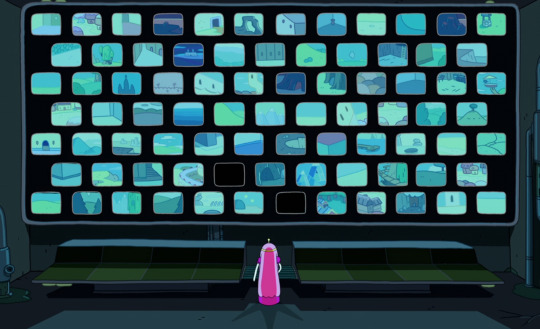
In The Cooler, Bonnie directly admits to this. “I’m PB. I spy on everybody. No big D.” She knows she’s not the perfect princess on a high pedestal that she put herself on. She is a deeply, deeply, fucked up person.
My good friend pointed something out to me a few months back when we were watching her title episode. Even as a child, she’s very... well...
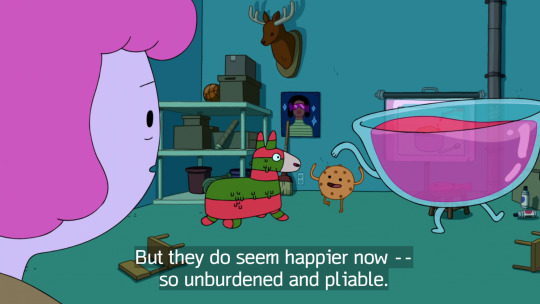
The use of the word “pliable” stuck out to us because... yeah... what?
I don’t think Bonnie is evil. I don’t even think she’s a bad person. Adventure Time is very good at depicting evil and showing that evil. The Lich, for example, is the living embodiment of evil. In The Comet, the Catalyst Comet says it embodies all that is good and evil, showing The Lich on screen for that segment, but nothing for the “good” segment which I’ve always found notable.

This image used for Gumball’s ambitions is also something I don’t think should be brushed under the rug. I know Gumball and Bonnie are very different characters since F&C is opposite not just genderswapped, but I still think it’s of note.
We see PB grow a lot over the course of the show, but we also see the people around her change their perception of her. Finn is a major example. In the first few seasons, he sees her as this untouchable goddess, but you can see his opinion of her change, especially in seasons 9 and 10. And keep in mind, that it was NOT Finn who stopped PB from going to war. It was Shoko.
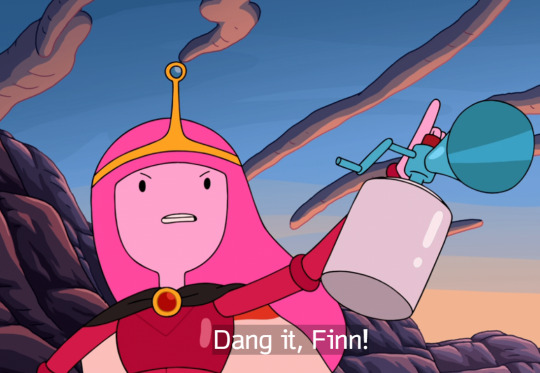



We also see that Marceline has to really keep her in check at times; reminding her to have like... basic empathy
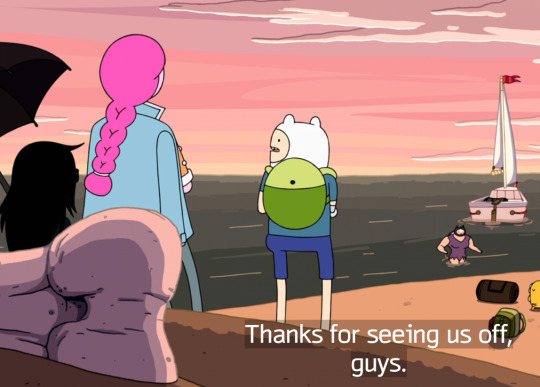
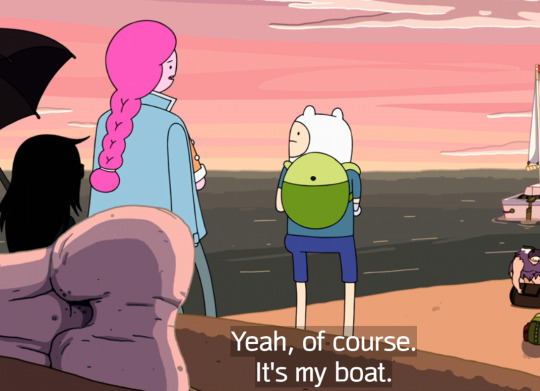
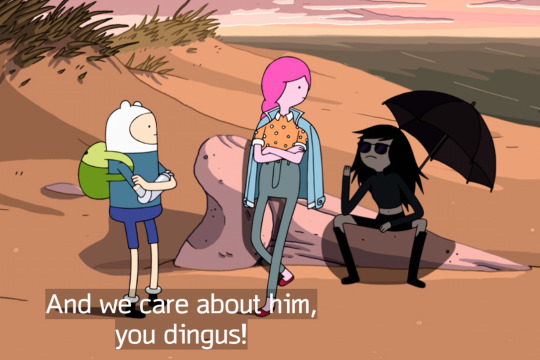

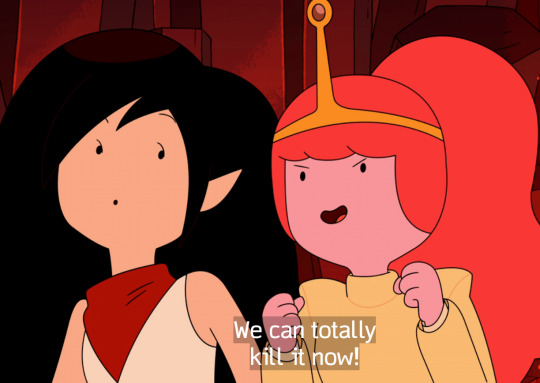
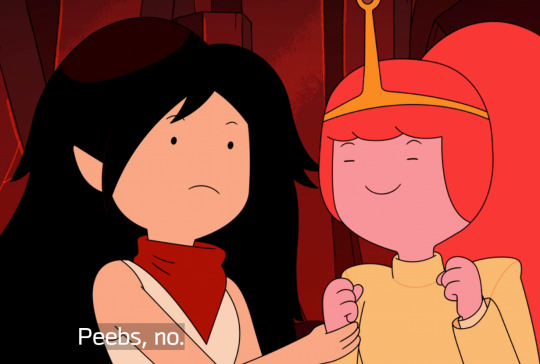
We know that she isn’t proud of her past, and yet continues to make the same mistakes she made hundreds of years earlier. I love her, she’s probably my favorite character. Not just in Adventure Time, but across like... all media. She’s so interesting and well written and there is SO much to dissect.
There’s a lot to say about a character who grew up in a nuclear wasteland, literally creating life because she was so lonely. Do morals really have a place in a world so broken and lost to time that humanity does not exist in the same way it did before fallout? Humans exist, sure, but are they human? At the core, are they human?
#adventure time#rant#infodump#analysis#atimers#IM SORRY THIS IS SO LONG BUT OH MY GOD IM SO INSANE#princess bubblegum#adventure time analysis
848 notes
·
View notes
Text
i just realised that the ice crown seems to grant its host immortality in the form of not physically aging, and ice king only visually reads as an "old man" to the viewer for reasons unrelated to age (long white hair and beard due to evergreen having white hair, receding hairline coming from wearing the crown too much)
this is further proven by ice king not having any visible wrinkles (compare this to simon in fnc) and also winter king being... a thing in general. winter king is as old as ice king (if not older) but he has a pretty young appearance
and when ice king's magic got taken away by bella noche in that one episode, simon initially looked like his young self before he ever put on the crown, and then during the episode he begins to age rapidly
so BASICALLY, this means that technically ice king is physically about 40-something, he just happens to have a long white beard and a receding hairline. that's very funny to think about
#this also suggests that if ice finn had kept the crown then he probably would've stayed about 15 forever and thats kinda wild to think about#imagine being terrorised by the same teenager for like 20 years straight HELPPP#adventure time#adventure time analysis#adventure time theory#its kind of a theory ig#ice king#simon petrikov
54 notes
·
View notes
Text

DO YOU UNDERSTAND HOW CRAZY THIS MAKES ME LIKE. OKAY: THIS ENTIRE STATEMENT IS AN EPITAPH TO A PERSON WHOSE LIFE ABSOLUTELY SUCKED. TERRIBLE THINGS KEPT HAPPENING TO HIM. LIKE HE SAW GENUINE HORRORS. "EVERYTHING WAS BEAUTIFUL AND NOTHING HURT" (OG LINE) IS THIS. TENDER, OPTIMISTIC DENIAL. OF MAKING THE LAST THING YOU TAKE TO THE GRAVE WITH YOU SOMETHING SO, WONDERFULLY NAIVE AND CONTRARY TO THE REALITY YOU LIVED IN.
BUT (and i know they probably just changed the line up for other reasons). THE LINE IS ORIGINALLY "EVERYTHING WAS BEAUTIFUL AND NOTHING HURT" .... Because it is an epitaph. Its something to be put on a grave stone. THE ENTIRE MEANING CHANGES IN THE PRESENT TENSE!!!!! It implies this is Ongoing.
Okay bye
78 notes
·
View notes
Text
Adventure Time has the best redemption arcs
I love deep-diving into my favourite shows, which makes me lucky that Adventure Time has been analyzed to death.
It's awesome because it feels like the show itself is growing up along with Finn. The older seasons are a lot more episodic and focused on the surreality of Ooo. Meanwhile, the later seasons really embrace the show's complicated lore and the idea that morality isn't black and white. The progression of maturity in this one show is INSANE. As the show becomes more mature, so does main character Finn, physically and emotionally.
Nowhere are the show's themes and Finn's personal growth better demonstrated through the show's use of redemption arcs. As the show progresses, classical villain-hero archetypes are subverted to show that Finn is learning that people aren't exclusively good or bad. As the show and Finna age, being a hero or doing the right thing evolves from the basic idea of "fighting evil" to being empathetic and seeking peace.
Heavy spoilers for the main series after the cut.
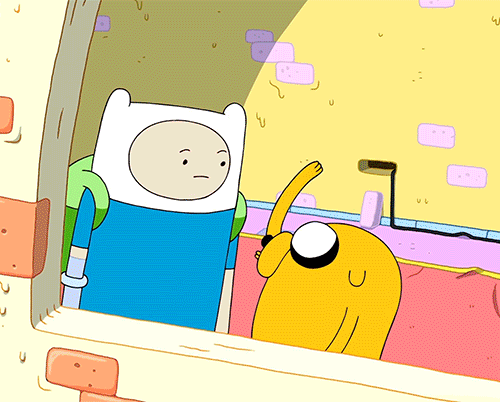
Some context
I just wanna mention some facts about the show's history.
If you watch the first AT episode followed by the last episode, you're gonna feel disoriented. They're clearly the same show, but it feels like they have very different goals. Early AT is more lighthearted and less serious. The episodes have morals, but they're pretty simple. The randomness of Ooo is played more for comedy than for lore purposes.
Around season 5, the show started taking on a different direction. It's still funny and weird, but the characters are more fleshed out and the messages the show is trying to convey require a lot of digestion. For example, Princess Bubblegum is always smart, but the way she's depicted in episodes like"Enchiridion" vs "Burning Low." Although I consider this a massive improvement, it's unclear how much was pre-planned. Was PB always destined to become a control-obsessed, unethical ruler-scientist? Or was her initial characterization just Finn's crush?
Yes.
Episodes as early as season 1 ep 24 ("What have you done?") show PB acting more like a tyrant than a princess and have the Ice King depicted in a less antagonistic matter. The reason for the tonal shift in the later season is that as Finn grows up, his experiences change the way he perceives reality.
Ooo through Finn's eyes
Adventure Time is about Finn the human and Jake the dog, but really it's mostly about Finn.
The other characters get character arcs and have plot-relevant conflicts, but the show's main focus is dedicated to Finn's coming-of-age story. Finn is Ooo's hero: he's social, caring, and brave, and he's motivated by a strong sense of justice and a desire for adventure. All he wants is to try new things and help others at any cost.
However, he's only 12, at least at the beginning. His idea of being a hero is rooted in black/white morality. If you do bad things, then you're bad. Stopping bad people makes you good. And as a 12-year-old, he believes the only way to stop bad people is through violence.
The show is immature in this respect, too. For the first few seasons, there are two main antagonists. There's the recurring Ice King and his plots to force princesses to marry him, playing off the "save the princess" trope (more on him later). And then there's the Lich, who's a genuinely powerful cosmic entity that seeks to destroy life in all its forms. Naturally, Finn fights them both off through righteous punching.
The show presents this basic understanding of evil, that evil is as evil does. In the beginning, there's almost no nuance to these characters. And this is true with good characters, too.
Billy is a huge catalyst for Finn's character development, but you can see the show's limited understanding of heroism in his debut episode. Billy is Finn's predecessor in a way, being the number one fighter against evil. In "His Hero," Billy realized the fighting evil through violence didn't treat the root problem, opting instead for community activism. However, the show makes this look like a bad thing, with the moral of the episode being that violence can solve problems. Ironically, Finn's character development mirrors Billy, as he realizes over time that he fighting evil might mean hurting people he cares about. Case in point: Simon Petrikov, the Ice King.
The power of redemption arcs
Redemption arcs are controversial because they're ideal but they feel forced if they go unearned. In Adventure Time, redemption arcs serve a two-fold purpose: to convey the message that "evil" people can be understood and rehabilitated and to show Finn's developing maturity as he realizes this.
Ice King
The first character to get a real redemption arc is the Ice King. Initially, he's portrayed as Jake and Finn's natural nemesis, especially when he targets Princess Bubblegum. However, as the show goes on, it becomes clear that the Ice King isn't really malicious; he's just lonely and he doesn't know how to socialize in an appropriate way. Over time, he becomes a sympathetic villain. However, this changes with the Christmas specials "Holly Jolly Secrets, parts 1 and 2." In this episode, Finn and Jake discover the Ice King used to be a man named Simon, whose personality and sanity were corrupted by magic. Simon's backstory is further developed in "I Remember You" and "Simon and Marcy." From this point on, Finn starts referring to the Ice King as Simon, acknowledging Simon's true self and stops treating him less harshly. This leads to a really heartwarming moment in "Don't Look," where Finn's perception literally warps reality, causing the IK to revert to Simon (in appearance but not in personality).
Consequently, the Ice King becomes less antagonistic in general and we even get IK-centric episodes where he takes on a heroic role. For all intents and purposes, post-season 3 Ice King is Finn's friend. The show went from using a cliché villain-type to dedicating a significant amount of time and plot to Ice King's eventual return as Simon. From this, Finn learns that treating people with kindness is imperative to stopping evil. Not only did finding out that IK's personal life was tragic but by treating him as a friend he diminished IK's evil inclinations.
Magic Man
Magic Man is one of the more disturbing characters on the show. He always shows up to do something gross or psychologically messed up. Unlike the Ice King, who was shown to be evil because he wanted companionship, Magic Man wants people to suffer out of pure contempt for the world. His "pranks" include simple stuff like turning Finn into a foot, to more deranged acts like forcing Jake to escape a dream world where doing so would mean destroying all his new friends.
What's interesting about Magic Man's redemption arc is that Finn and Jake have little to do with it. Magic Man redeems himself practically by accident.
We gradually learn that Magic Man's wife was destroyed by GOLB, a powerful entity that can erase things from all realities. So Magic Man's cruelty is best described as frustration or vengeance to an extent. He is constantly suffering, which he tries to mitigate by deriving pleasure from others' suffering.
However, he eventually loses his magic powers (and with it, his anger and sadness) in"You Forgot Your Floaties", grounding him back in reality. From then on, his journey is one of atonement. He tries to reconcile with his family and seeks forgiveness from the people he has tortured.
This arc says more about the show's maturity than it does about Finn's. Although Finn shows no hatred towards a magic-less Normal Man, he seems pretty indifferent. The show, on the other hand, takes the time to make him a tragic figure and offers him a chance at redemption. It wants the audience to know that experiencing loss is not an excuse for being a jerk, but it can explain someone's actions.
King Man's (his title after rejoining the Martian community) redemption arc also demonstrates AT's advancing writing skills. Instead of giving King Man a clear-cut redemption arc, the show depicts him as genuinely sorry without changing his personality. King Man is still obsessed with Margles and is harsh with Martian prisoners, but he's no longer angry with the world. He hasn't moved, as is difficult to do with grief, but he wants to contribute to society instead of rage against it.
Betty Grof
Betty marks a milestone in the show and Finn's personal growth. She is the first antagonist who is shown to be sympathetic from the start. It helps that we know Betty before she goes crazy with magic, but despite that, Finn nor the show ever thinks of Betty as an "evil" character. She's misguided and unethical but well-intentioned.
Betty's whole deal is that she wants to be with Simon, which requires curing him of the Ice King Crown's effects. However, after she absorbs Magic Man's madness and sadness, she starts undertaking strategies that cause Ice King more stress than good.
She becomes a true antagonist in the Elemental mini-series when she prioritizes Simon's recovery over the lives of Ooo's inhabitants, despite the Ice King begging her to save his friends. Even after she betrays Finn, he doesn't seem to see her as a villain specifically. The real source of conflict in the Elemental series was more so the unchecked emotions of Finn's friends; Betty was just an obstacle.
Betty's redemption arc is completed in the show's finale. Betty summons GOLB, risking the entire universe's destruction to save Simon. Except her goal is not only to save Simon but to save their relationship. In an act of self-sacrifice, Betty manages to banish/merge with GOLB to save Ooo, despite knowing she could never be with Simon.
However, it's not as clear as I make it out to seem. While Betty does sacrifice her relationship with Simon, she still manages to save him, begging the question: if Betty couldn't save Simon, would she have made that decision? (I'm inclined to think no, but let me know what you think!)
Even if the "redemption" part of her arc feels rushed, it's Betty's journey that highlights the show's maturity. Just because she does bad things doesn't mean she's a bad person. Finn gets this; he doesn't blame Betty for almost destroying the world. He's more focused on aligning with her desire to save Simon and the rest of Ooo.
Through Betty, Adventure Time explains that it's impossible to judge people as good or evil. To do the right thing doesn't mean to help people who you think are "good" or oppose people you think are "evil" but to find common ground and a common goal.
Uncle Gumbald
He's basically the last antagonist of the show. I don't think there's a lot to say about him that hasn't already been said, so this section will be short.
He's a lot like PB in that he's a visionary. Their conflict stems from their competing ideas and the fact that they both want to subjugate each other.
They almost reach an understanding in the finale when they experience each other's lives, with PB realizing that Gumbald deserved to be treated as an equal. However, he isn't redeemed because he attempts to subjugate PB anyways by faking a truce. I feel like this was supposed to highlight PB's character growth as early PB definitely wouldn't have been willing to share authority.
Fern
I would say this is probably the most important redemption arc for Finn's character. It's weird to say that because Fern is introduced so late into the show and his arc is completed when he dies in the last minutes of the finale. Furthermore, he's a strange character to begin with. He's a grass clone of Finn made from two magic swords, and he's hardly antagonistic toward Finn except in the last two seasons.
But let's look at what we're dealing with here.
Fern's internal conflict is an identity crisis. At one point in the series, Finn comes into contact with a past self (merging timelines situation, dw about it), turning one of his selves into a sword. It's intentionally ambiguous at first, but it's eventually revealed that there is a miniature Finn inside the sword who is cognisant of the world around him. Because of Real Finn's carelessness, Sword Finn ends up getting busted, and eventually infected with a grass parasite, creating Fern.
Up until now, Finn has been acing his new pacifist approach to conflict resolution. He now prioritizes understanding someone's actions and reasoning with them, saving fighting as a last resort.
Fern represents Finn's greatest empathy challenge: trying to understand someone he thinks he already understands. To do this, Finn has to accept that his preconceived notions of Fern are wrong and take the time to get to know the real Fern. He thinks that because they share some sort of biology and memories, they are the same people. He fails to acknowledge the different life experiences that have forged him and Fern into distinct people.
When Fern heel-turns into an antagonist, it's not a surprise. We have seen repeatedly the jealousy that he feels outcasted by the real Finn. We also know he's frustrated with the dissonance between his past "life" and his current circumstances. Like Betty, Finn doesn't see Fern as a villain. However, he doesn't try to understand where Fern is coming from. He assumes that because they are similar, Fern will be willing to talk things out. In other words, Finn wants to reconcile with Fern but doesn't get how devastating Fern's identity crisis is.
In the finale's dream-dimension fight sequence, we see Finn finally hear out Fern's concerns and the two explore Fern's past together.
Fern does die because of plot reasons, but not before re-establishing his and Finn's friendship. I don't really like it when stories sacrifice one character for another's development, but it makes sense given Finn's narrative is about realizing that doing the right thing isn't always a feel-good experience. Finn wants the people he cares about to be safe, and he knows that Fern is in danger by siding with malicious characters like Gumbald. Fern also decides to align with people who care about him rather than someone who wants to use him. If Fern's villain arc is caused by feelings of inadequacies, then it's resolved through self-acceptance. Redeeming Fern requires Finn to truly understand Fern, but this means Finn loses someone who gets him.
I think it's implied Fern could never be at peace alive, since the grass demon was keeping him alive while corrupting his heart. It's a unique take on a heroic sacrifice: setting Fern free means letting Fern go.
Misc. thoughts
Not all redemption arcs are equal. I wanted to touch on a few mini-redemption arcs that either didn't fit the post or had a lesser impact on the story. These aren't relevant to the text, so feel free to skip to the conclusion.
Irredeemable villains
Some AT antagonists never get redemption arcs. These are usually one-off villains who don't get much characterization apart from just being evil. I don't think that AT wants to imply these people are beyond help (see Magic Man for proof), but maybe becoming a good person means that someone has to understand you first, which is harder to do in some cases. Examples include:
Ricardio the heart man
Thief Princess
Wyatt
Redemption arcs?
Originally, I wanted to write a section on Princess Bubblegum and how she gradually releases her iron grip on her kingdom. However, I decided against it because Finn never really sees her as a bad person. However, understanding that she's not perfect is definitely part of her arc. If I were to write about PB, it'd have to be a separate article, probably incorporating how Marceline plays into her character development and how her relationship with evolves over time.
Another character I omitted from this analysis was Lemongrab. I wouldn't describe his arc as a redemption arc because I feel it was more focused on self-discovery than making up for his past actions.
Finally, I thought about writing about the Lich's transformation into Sweet Pea, but I almost don't count it since they are essentially two different characters. A redemption arc to me means that a character undergoes a change of heart. I feel like Sweet Pea is more like the Lich reborn, and while you can argue that the events in "Whispers" are the good Lich fighting against his dormant persona, I feel like it's clear that Sweet Pea and the Lich are not one and the same. Either way, Sweet Pea being the Lich's redemption is to muddy to discuss in this context.
Becoming good
One thing I like about Adventure Time is that no one tries to make the bad guys turn good. Redemption arcs are mostly self-initiated. With characters like Ice King, Finn doesn't try to turn him into a hero, he just stops treating Simon like a villain. Unlike in other media, heroes and villains are not real roles in AT. They are more like social constructs that are easily altered once you start to empathize with supposed villains.
But while "villains" is a flexible term in AT, evil-doing is not. AT puts forward the standard that people should seek forgiveness and atone for the ways they've caused harm. It's a pretty grown-up idea that we should own up to our actions but also forgive people who want to be forgiven.
Conclusion
In Adventure Time, Finn wants to be a hero, but in trying to do so, he needs to answer this question: "What makes a hero?" Originally, the show asserts that a hero is someone who beats up bad guys and obeys people in authority. But as Finn and the audience get older, the show's ideas evolve, too. Through the use of its extensive rogue gallery, Adventure Time affirms that "bad people" are usually just normal people with personal issues. Heroism becomes less associated with righteous violence and more geared towards empathy and reconciliation. Eventually, Finn and the show give up on the hero-villain dichotomy, acknowledging that these categorizations prevent people from helping those who need it most.
Note: this is the first analysis I've posted on Tumblr and I'm planning on writing more with the goal of getting better at writing and media literacy. Additionally, I really love this franchise and I'm always down to discuss it further. Please let me know what you all think?

#adventure time#adventure time analysis#tv analysis#cartoon network#finn mertens#finn and jake#princess bubblegum#ice king#magic man#betty grof#fern#uncle gumbald#golb#the lich
266 notes
·
View notes
Text
Wake up, babes, new Fionna & Cake Official Trailer just dropped
And I'm analyzing the heck out of it
First of all, let's establish that the series will take place in several different dimensions. The first one we see is Fiona's (First picture). This world seems to be similar to ours; no mushroom war to be seen around, and people live normally. The second picture, however, is the world of Adventure Time. I think this is the city that humans have built on the Land of Ooo after arriving there at the end of the series. Simon apparently moved there, as can be seen by his apartment corresponding to the color palette of the human city + the little human girl.
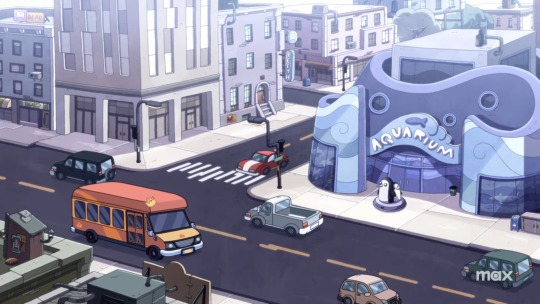
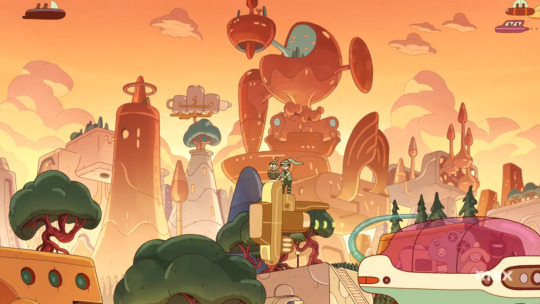
Interestingly, Simon's apartment has a lot of relics from the past: phones, a vinyl player, and a hair dryer. For me, this is an indication of his deep nostalgia for the past and the pain of seeing the world change around him so drastically. It is completely understandable because, unlike Marceline, Simon (being stuck in the form of the Ice King) never had time to process the trauma of his world coming to pieces.
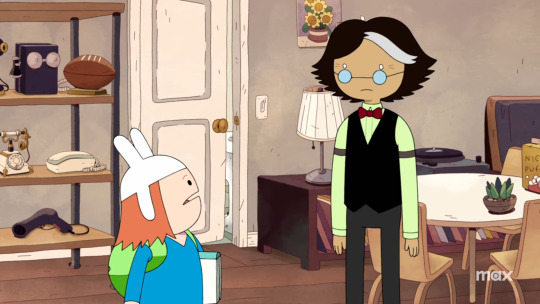
The next interesting picture we see is the Ice Prince Finn. The Ice Prince Finn is Finn from when alternative dimension (Farmworld Finn). In this parallel dimension, the bomb never exploded, so mutations never happened. Farmworld Finn makes his first major appearance in the episode "Finn the Human," where he gets possessed by the Ice King's crown and becomes the Ice Prince Finn. Interestingly, The Ice Prince Finn was later cured from the crown in an episode called "Crossover." My guess is that in the Fionna series, either we will see The Ice Prince Finn before he got cured OR the world where Finn never got cured. The first one is more believable.

Fionna says that she keeps having a dream about "a cruel Ice Prince." Finn is the only one who has ever been called the Ice Prince. But if we compare the appearances of the mentioned characters, it is clear they are not the same. So the question remains: who is the newer Ice Prince? This one looks way younger than our Simon when he got possessed by the crown (third picture). However, the new Ice Prince indeed looks very familiar to Simon, only younger. My guess is that this is Simon from an alternative dimension who got fully possessed by the crown the moment he got it. If we look at the young Simon from the episode "Holly Jolly Secrets," he is almost identical to the new Ice Prince.
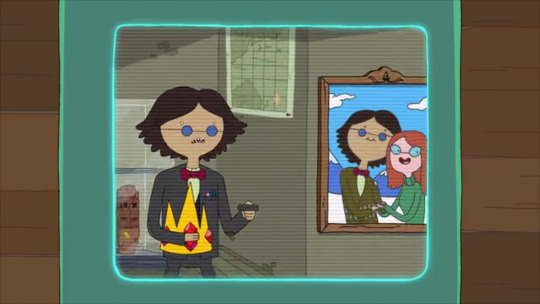
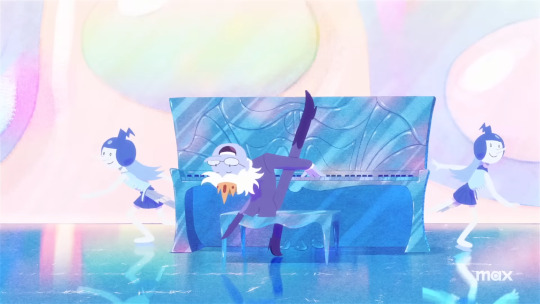
All of these pictures seem to be from the Farmworld Finn's dimension. I suppose it will have major importance in the series. And yes, this is my beloved Huntress Wizard. I so hope for some Finntress content (we were robbed in the main show).
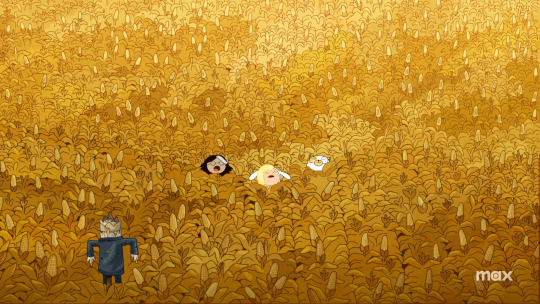
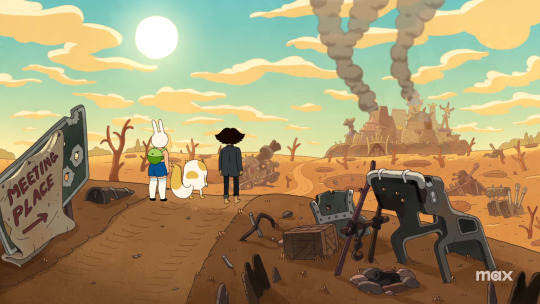
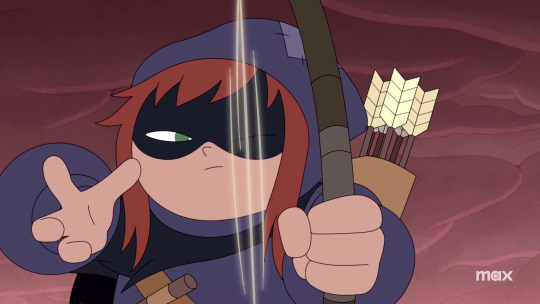
That's all for now. The trailer has way more secrets and things to decipher but I am too tired. Please share your theories! Thanks for reading.
youtube
#Fionna & Cake#Adventure Time#Adventure Time theories#Adventure Time analysis#Fionna & Cake theories#Fionna & Cake analysis#Fionna & Cake trailer#Adventure Time: Fionna & Cake trailer#Ice King#Farmworld Finn#The Ice Prince Finn#simon petrikov#i am so hyped#Finntress#Adventure Time theory#Youtube
84 notes
·
View notes
Text
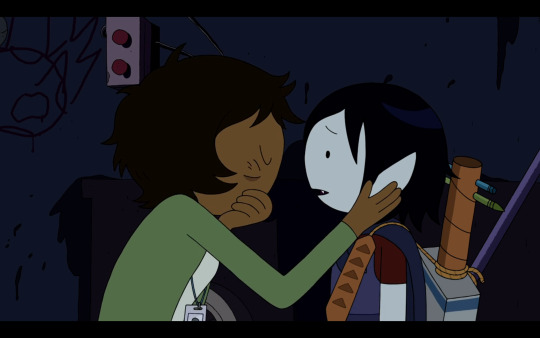
I’ve been thinking about Marceline’s flashbacks in Obsidian and how her mother was dying of what seems to have been radiation poisoning or something similar, while Marceline was fine. Like in hindsight, I think it’s easy to guess that Marceline’s demonic physiology made her immune to radiation sickness and other similar ailments.
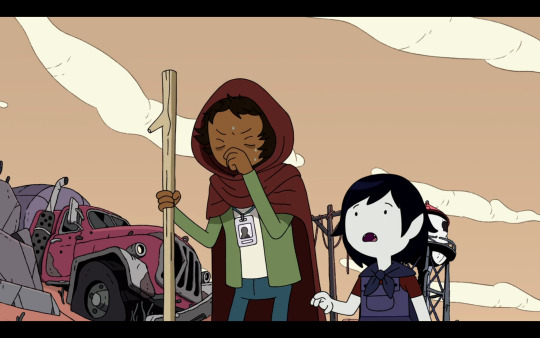
And it’s not just the sickness either. I think looking back at these scenes, we can see a very notable contrast in how Marceline and Elise are able to each cope with the Bad Lands. We see Elise needing to use a walking stick to traverse the sands and a patched-together hood to try and avoid exposure to the oppressive heat and sunlight, while Marceline seems wholly unbothered by any of that.
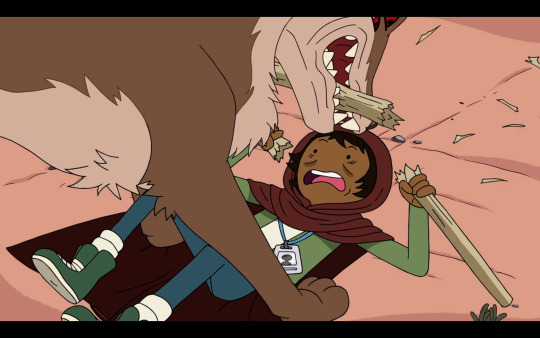
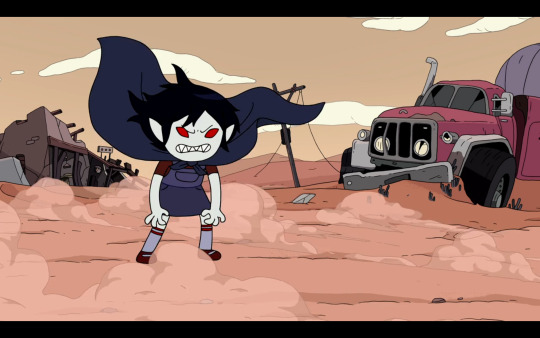
When the pair are attacked by the mutant ‘Waazup’ Coyote, Elise is basically helpless, losing her stick and being pinned to the ground, meanwhile Marceline is unfazed by the hit she takes from the Coyote and proceeds to easily kill it with her soul-sucking.
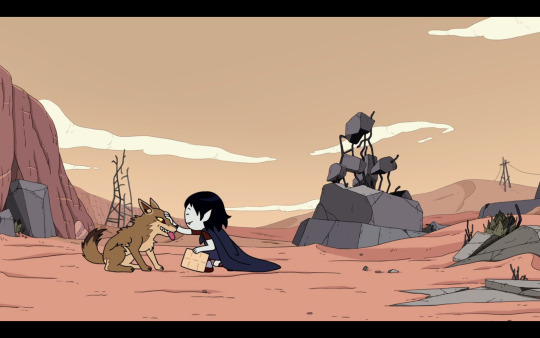
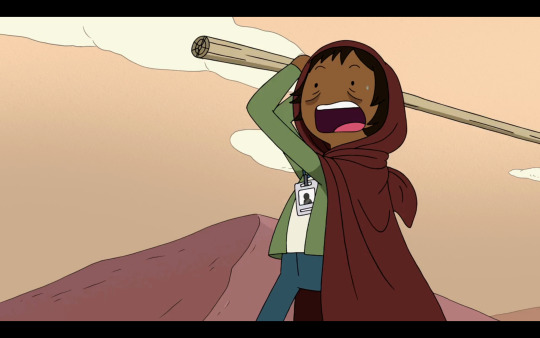
Even the events which lead to the attack show a clear contrast between the two: While Marceline is just happy to see a ‘funny looking puppy’, Elise is fearful and attacks the pup, thereby antagonizing its mother.
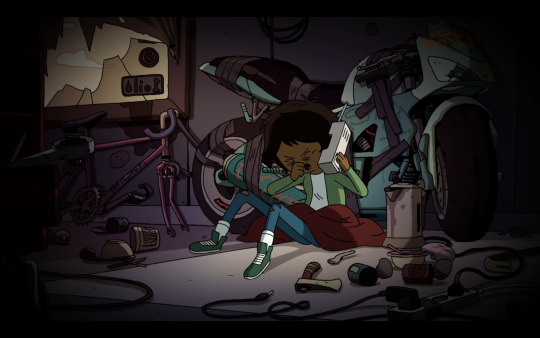
The differences here feel very apparent: Whereas the normal human Elise struggles and ultimately fails to survive, Marceline seems to be able to get by with little trouble at all. Going past Obsidian, I think we see much the same with Simon, with the Crown’s magic almost certainly making him immune to radiation poisoning, exposure and any number of other things that would grievously harm normal humans. And just like with Marceline’s soul-sucking, when Simon actually uses the Crown, he’s able to wipe out the attacking oozers and likely most any other threat in the wasteland with ease.
What I think we see here is a stark indicator of just how much the world has changed. In this new world created by the mushroom war, the ‘normal’ humans of old struggle simply to survive. Meanwhile, those who would likely be considered ‘inhuman’ like Marceline, Simon, the mutated creatures and others not only survive but can even thrive in this new world.
It all feels like a precursor of what we see in the modern-day of Ooo. Where the ‘normal’ humans of old are barely a distant, faded memory. And it is the Mutated, the Magic, the Cursed, the Demonic and so much else that would seem strange and horrifying to the humans of old have now become the new ‘normal’. To the point where even the humans that have survived the last thousand years only barely resemble their distant ancestors in their society and culture. And ironically, it is the non-human residents of Ooo who have a culture and society that more closely resembles that of old humanity.
To the point where a ‘normal’ modern-day human like Simon in Fionna and Cake feels strange and out of place.
#adventure time#adventure time rambling#adventure time analysis#marceline abadeer#marceline the vampire queen#adventure time elise#marceline's mom#simon petrikov
321 notes
·
View notes
Text
After all these years, ‘I Remember You’ is still one of the great highlights of Adventure Time Storytelling. And not just in the basic ‘what???? Silly children’s cartoon does something SAD??? HOLY SHIT MIND BLOWN’ way. But with the execution of that Something Sad. How it manages to pack so many Complex Emotions into just 11-minutes of television. And especially the way it utilizes the basic Adventure Time format for that purpose.
So Adventure Time is a Board-based show. Each episode has an outline pitched and written down by the writer’s room, and then this outline goes to a team of (usually) two Storyboard Artists who develop that simple outline into a full story. And with the show’s art-style deliberately eschewing staying perfectly ‘on-model’ in favor of having the animators take direct reference from how the different storyboarders draw the characters
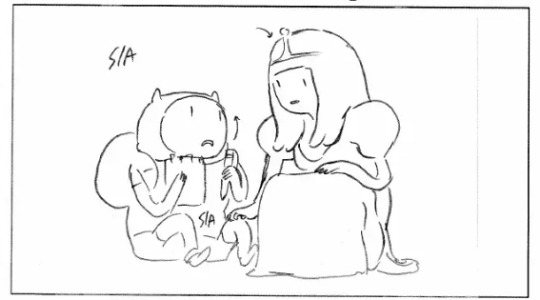

And the show being generally extremely versatile in terms of themes and tone - AT has allowed a lot of their Storyboarders to really express themselves and their unique artistic vision as part of the Big Collaborative Narrative that is Adventure Time.
Now, the Boarders who worked on ‘I Remember You’ are Cole Sanchez and Rebecca Sugar. These two were a Storyboarding Duo from the start of S4 and until Sugar left the AT Crew during S5, and they always struck me as a curious combination. I think really from all of the individual boarders working on AT during that time, these two really are the closest to having like… Totally Opposite Artistic Sensibilities as boarders.
With Sugar favoring a style that is very loose and sketchy and also very rounded. Focusing on expressions and subtle body language and lighting. And being famous for going deep in depth into Big Moments of Emotional Catharsis
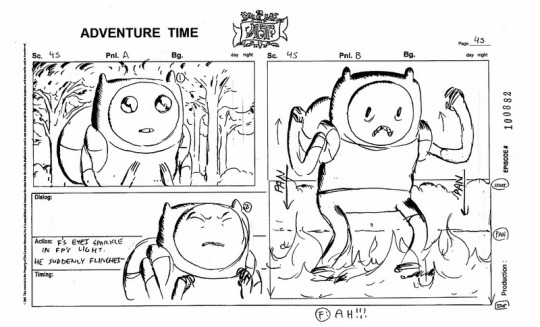
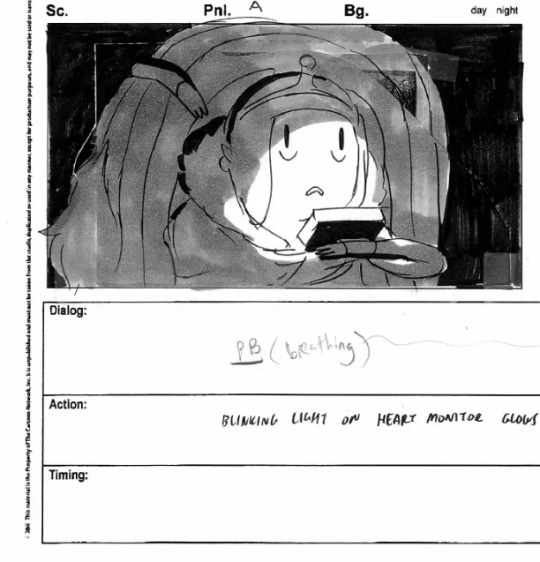

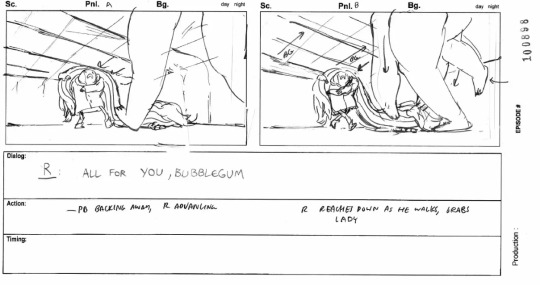
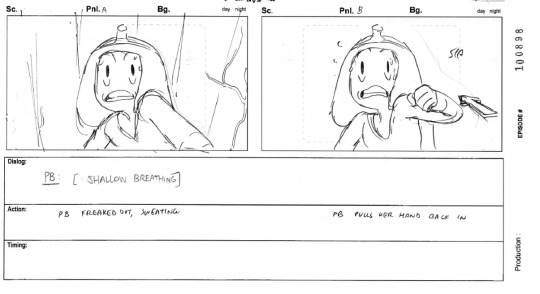
And Sanchez having a very clear art style that emphasizes strong silhouettes and clear lines that suggest flatness. Focusing more on major poses and the character’s positions in the space. And having just a really great eye for AT’s brand of silly humor.

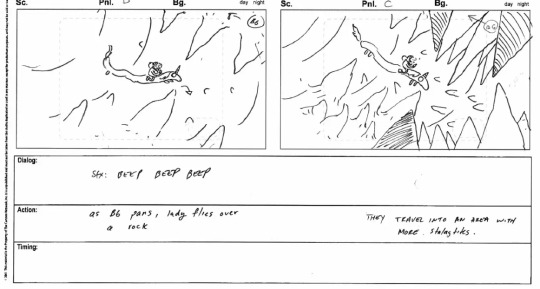

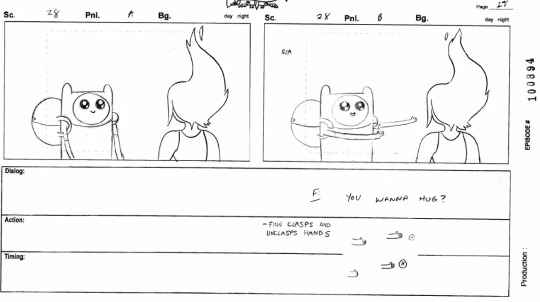

Like, I almost kinda suspect these two were paired together so they can each cover for the other’s “weakspots” in writing ‘Adventure Time’.
And there were a few episodes that did some really interesting stuff with this very contrasting pair - ‘Jake the Dog’ is another example. Giving most of the Farmworld scenes to Sugar and most of the Time Room scenes to Sanchez both plays to their personal strengths as storyboarders and helps to emphasize the strong emotional contrast between these two scenarios.
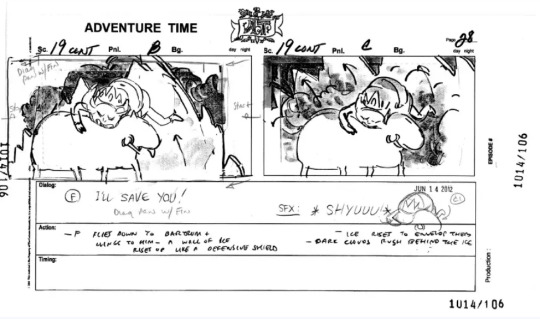
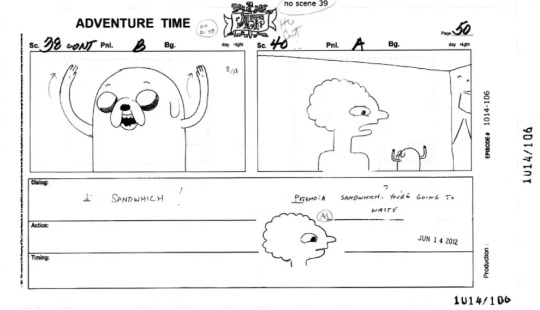
And ‘I Remember You’ is actually kinda unique among Adventure Time episodes cause… Most episodes will have the two boarders alternate between working on the episode throughout it. Like you’d have Boarder A draw a bit and then Boarder B and then Boarder A again… But “I Remember You” is divided between Sanchez and Sugar… basically perfectly in the middle.
So the entirety of the first half of the episode was boarded by Sanchez




Until Ice King pushes Marceline and then leaves the room in shame.
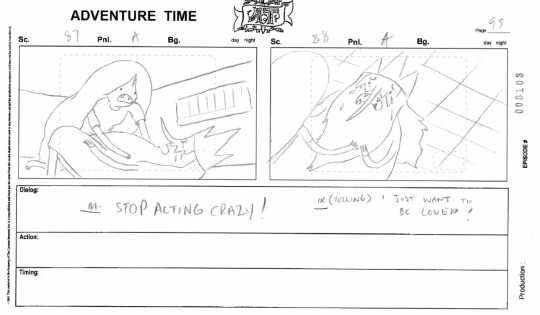

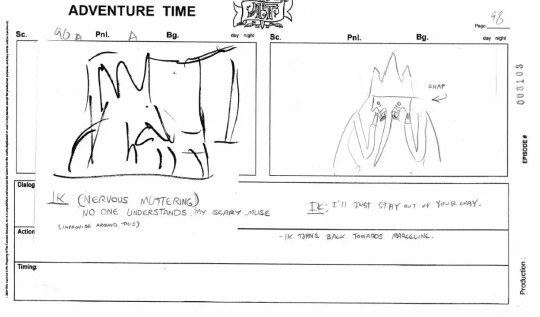
And then, Sugar takes over.

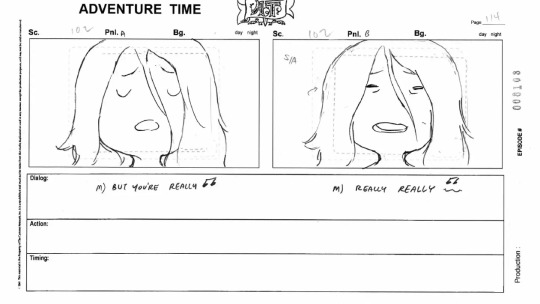
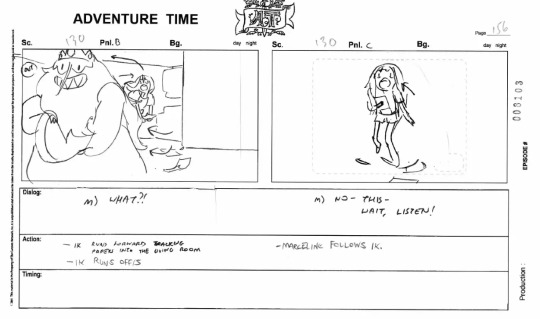
And, like, even if you don’t know anything about the Behind the Scenes of Adventure Time or who Cole Sanchez and Rebecca Sugar even are - the Shift is noticeable. The shift in tone, in narrative focus, in the subtleties in which the characters are drawn.

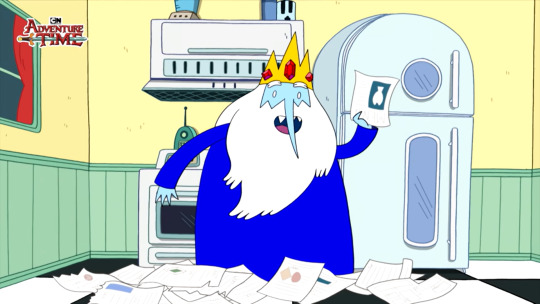
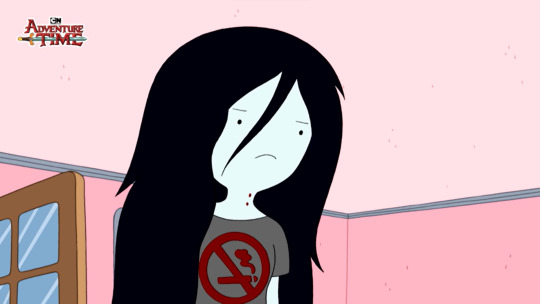
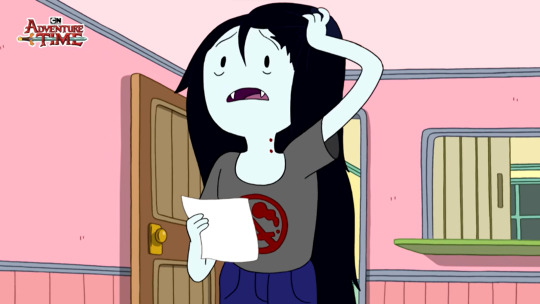
The entire first half of the episode has this thin veneer of just being a Silly Goofy Ice King Episode. Sanchez’s talent for Adventure Time’s brand of comedy is on full display… but there is also this underlying feeling that Something is Happening just under the surface. And these hints of the Big Emotions of ‘IRY’ expressed via Sanchez’s kinda goofy style really create this balance between putting the audience into a false sense of security that this is just a Very Normal Episode about two characters hanging out and the Tension constantly brewing in the subtext.
And then it all comes to a blow.
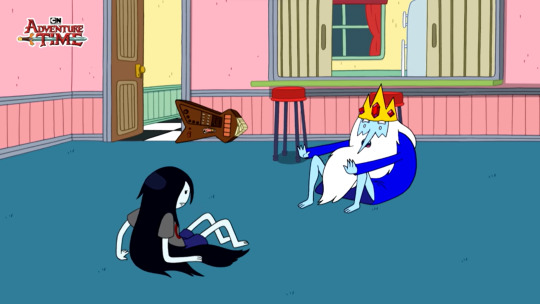
And then the Shift happens. And now we are in Sugar’s court.
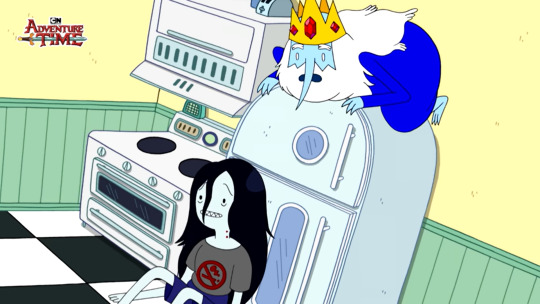
And this subtle shift in the artstyle and storytelling also coincide with Marceline finally openly expressing her feelings and the Reveal of Simon and Marcy's shared past. The episode changes focus from Ice King's silly antics to Marceline's feelings. Everything changes, everything in the first part of the episode gets recontextualized and... even on the most basic level, the episode is now Noticeably Different.
I would almost say that Sanchez’s half of the episode has Ice King define the tone, while Sugar’s half of the episode has Marceline define the tone. But more than anything it’s the catharsis. The reveal and release of those emotions that were building up so expertly through the Sanchez half of the episode. All of the Sugar-boarded scenes in this episode are really heartbreaking on their own, just through the tragedy of the story and Sugar’s expert knowledge of howto convey emotion in the visual medium - but it’s so enchanted by what came before it.
“I Remember You” is truly a great testament to how ‘Adventure Time’ could use every aspect of its medium to tell a great story in such a short time.
#adventure time#at#atimers#adventure time analysis#i remember you#rebecca sugar#Cole Sanchez#storyboard#ice king#simon petrikov#simon and marcy#the ice king#marceline#marceline the vampire queen#marceline abadeer#at ice king#at simon#adventure time ice king#adventure time simon#ice king adventure time#simon adventure time#simon at#marceline adventure time#at marceline#adventure time marceline#marceline at
507 notes
·
View notes
Text
I believe Neptr is still playing hide and seek in the AU where The Lich won. Since Neptr is a robot, he didn't die similar to BMO but is still hiding. Not even knowing that everyone is dead. He's just assuming that they're playing Hide and Seek. That's just..fucking sad.

#adventure time finn#adventure time#adventure time fionna and cake#fionna and cake#adventure time analysis#neptr#adventure time ice king#adventure time simon
90 notes
·
View notes
Text
thinking about the fionna and cake finale and. i've been seeing people upset or annoyed that betty & simon's story focused on how simon had to learn to recognize that what they had was unbalanced and not necessarily fair, because they wanted betty to also realize that she placed too much of her self worth in simon, and they wanted her to learn to live for herself.
i think these people forgot about the episode in adventure time that does this. mainly because, at the end of the episode, it seems like she didn't learn anything at all.
In s10e11, "Temple of Mars," Finn, Jermaine, and Betty have to go through a mind maze to find Jake--and many parts of the maze are relevant to Betty's obsession with Simon/Ice King.
The second room of the "maze" has a chalkboard with a long and complicated equation on it. Betty tries to solve it, thinking it will help, while an Ice Thing messes up the equation as she tries to solve it, preventing her from doing so. It's meant to represent how trying to "solve" the crown's curse is leading nowhere, and that Betty is trying for a hopeless cause.
The last room is the most important to Betty's story, though--it's a window into her past, where she realizes that she needed to take more time for herself. She needed to focus on her, instead of dropping everything for Simon. She makes this realization and changes things for the hypothetical, maze room version of Betty--but naturally, this can't change the past. She's made her choices, and she has to live with that.
I think at the end of the episode, when she takes the "wrong" message away from all of this--she dedicates herself to trying even harder to "fix" Simon--it's mostly because she's scared to accept that she... not wasted, but lost so much of her life because she was so focused on what Simon wanted, or what she thought that Simon needed. She's also still under the effect of the Magic Man hat, so she's still affected by the sadness/madness of that, which likely twisted her view of the situation as well.
But then in the AT finale, she makes her choice to leave Simon. She does it through wishing for his safety, sure, but she still makes the choice to leave him. And in Fionna and Cake, what we see of her--or what's left of her, because we don't know how she's changed, really--is something bigger than what she was before. GOLBetty seems to have realized her own part in the unbalancing of the relationship between them. But that's not what Fionna and Cake is about--it's about Simon, and how he has to move on. Betty has already moved on by the time we see her again. She's showing Simon that, and she's showing him that he has to move on, too. But it's her choice. She could have stayed with him, but...
She takes the bus to the airport. And she takes it without him.
#adventure time#fionna and cake#simon petrikov#betty grof#adventure time analysis#fionna and cake analysis#idk. thinking thoughts.#they're so important 2 me. they are so in love#they had to MOVE ON and they have to LIVE WITHOUT EACH OTHER and they have to do whats right for themselves and im so normal abt it i swear#and betty made that realization earlier than simon did but she was too afraid to admit it until now#and she was right!!! and simon recognized that!!! and he let her go!!! and she wanted to go!!!! im so. augh.#also hot take but some ppl saying they wanted betty to “realize that she was also at fault” are just taking the whole situation as like#“uwu simon didnt do anything WRONG betty never TOLD HIM how was he supposed to know it was happening so really its HER FAULT” like girl no#they are both at fault. she shouldve done something but he shouldve noticed#augh. im unwell about them. anyways
105 notes
·
View notes
Text
Fionna and Cake: Simon and Marcy So Far: Analysis Part 1
INTRO:
The first two episodes of Fionna and Cake have been released, capturing the hearts of fans, and with it, some new Simon and Marcy content has dropped. Ever since the father/daughter duo made their debut in Adventure Time’s tearjerker episode “I Remember You” (season 4, episode 25) they have smote the hearts of fans everywhere. With the first two episodes, here is my analysis on which direction their relationship is going in this spinoff series.
FLASHBACK:
Fionna and Cake Episode 2 “Simon Petrikov” opens with the two running away from some oozers. They take shelter in a sewer. Simon considers putting on the crown, but Marcy pulls his hand away and glares at him. The oozers leave the two to chat. The button of Marcy’s overall dress pops off and Simon begins sewing it back on. Marcy asks him what she’d do without him. Simon assures her that “you’re so great, Marceline, someone else would definitely find you and take care of you. Maybe even someone rich!” Simon continues this fantasy, telling Marceline that she’d live in a castle with “food, medicine, and trained squirrels to tend to your every need. And as for me, I’d uh…um…” Simon directs this at Marceline, but he seems to be saying what he wants for Marceline. In Stakes Episode 2 “Everything Stays,” when Simon is officially leaving Marceline and barely holding onto his sanity, he promises he’ll send someone to take care of her. (On a related note, we see in season 7 episode 10, “Marcy and Hunson,” that Simon summoned Hunson to take care of Marceline until she left his care after the fries incident.) Simon wants Marcy to be safe, and he’d want to believe if something happened to him Marceline would be okay and someone would come take care of her. For food, obviously in the apocalypse, food would be hard to find. In season 5 episode 14 “Simon and Marcy,” Marceline tries to make Simon breakfast and resorts to pine needles and deer guts. For medicine, we can see Simon worries a lot about Marceline when she gets sick. We see when Marcy gets a fever in “Simon and Marcy,” he dedicates the whole day to finding chicken soup for her. He’d want her in an environment where she can access healthcare easily. For trained squirrels, well, it’s a funny way to put it, in classic Adventure Time style, but I think it ties back to Simon wanting Marceline to be well taken care of. But we can see he doesn’t really have any plans for himself. He’s lost his home, his books, his fiancee, and his entire life’s structure at this point. Marcy and whatever he carries in his backpack is his entire world now, and he can’t imagine what his world would be without her to take care of.
THE FUTURE:
Simon trails off when he talks about a life without Marceline. And now we’re in a future where this…kind of came to pass. Don’t get me wrong, Marcy and Simon are still close. Simon calls Marcy, Marcy is happy to hear from him even though she’s busy–more on this phone conversation later–and Marcy mentions hanging out soon. But Marceline can longer be Simon’s whole world like she used to be. She’s grown up, she’s been taking care of herself for about a thousand years and she has a girlfriend and lots of friends and acquaintances. Heck, she hasn’t just been taking care of herself, she kept Ice King company and took care of him in a way too. She’s delighted that Simon’s back, but she’s no longer dependent on Simon’s protection like she used to be. She’s also no longer right there to observe Simon’s behavior and remind him to take care of himself, like we see her doing in the flashback when he almost puts on the crown. Not only does Simon not have Marcy to take care of, he doesn’t have any reason not to spiral into this depressive state he’s in at this point (Fionna and Cake Episode 2 “Simon Petrikov,") and he doesn't have her little reminders.
Which brings me back to the subject of their call. Marcy immediately asks Simon how he’s doing, and how’s work. Simon responds by saying it was fine, skimming over how bad it actually was. But why? Why is he doing this?
CHILDCARE IN THE APOCALYPSE 101:
A big part of parenting in the apocalypse would’ve been keeping Marceline calm so she doesn’t panic. When Marceline gets a fever in “Simon and Marcy,” the first thing Simon says after waking up, feeling her forehead when she's sick and mentioning the fever got worse is “I mean, don’t freak out or anything.” We can see through what glimpses we get of his travels with Marceline that he’s very optimistic and playful. He makes up a song for Marceline (Marceline mentions him making up more silly songs), plays games with her, makes a lot of jokes (humor is one hell of a coping mechanism), and in the flashback we see him telling Marceline that this is one of the nicest sewer’s they’ve hidden in. I think it’s important for us to remember how quickly Marceline grew up to Simon. Not even in the usual “they grow up so fast” way, but as in, when he left her, she was about ten years old. The next time he saw her in any fit state to recognize her, she was a thousand years old with the mindset and body of a young adult. The timeskip would’ve been jarring for him, to say the least. It’s been about twelve years since that sudden change, but old habits die hard. Simon hasn’t stopped trying to keep Marceline from freaking out over a lesser problem. Not just because he’s used to keeping her calm in the apocalypse and can’t help but view her as his little girl still, but no one likes admitting to a loved one they’re experiencing a mental health crisis* in the first place. Along with this, while in his state of magical madness, Ice King’s condition doubtless caused Marceline a lot of anxiety and unhappiness. On top of his habits of not freaking her out and the usual desire not to explain what you’re going through, he wouldn’t want to cause Marceline any more grief than she’s already been through. Don’t worry, Simon, Marcy’s already super traumatized. Helping you out won’t hold a candle to everything she’s been through.
THE PHONE CALL:
I feel like what really drives home the difference in how Simon still sees her vs. how she is now is the phone call. Don’t get me wrong, Simon loves Marceline and is doubtless happy for her that she has a girlfriend, a career in music, and a life.
But when he calls Marceline, he’s been reminded of her by watching little girl’s caretaker help her reach a watermelon. A little child. When Simon calls her up, she is getting matching tattoos with Princess Bubblegum (or, trying to, anyway, but her skin keeps instahealing and PB is made of literal gum). Getting matching tattoos with the person you plan on spending your life with is a much more grown-up activity. The music also serves as an immediate contrast between the atmospheric quiet of the forest and gentle strumming and singing of Rebecca Sugar, compared to the rock music blasting in the background of Marceline’s antics. The contrast between the future and the past. The contrast between what their relationship used to be like, something that gave Simon’s life structure and hope, and what it is now–still loving, but not something he can model his whole life around.
ONE STEP FORWARD, TWO STEPS BACK:
Their dynamic has changed. Simon used to be the one keeping Marceline from despair and taking care of her. Now not only is Marceline living her best life with her girlfriend (Simon has neither of those), but Simon’s the one in danger of despair. Simon is used to taking care of Marceline, but they can’t be that way anymore, since Marcy is grown up and took care of him at one point. A good visual metaphor for this is at the beginning clip of Simon and Little Marcy. When they’re running from the oozers, at first, Marcy is behind Simon, and Simon, also running for his life, pants “C’mon” to her. A few seconds later, Marceline is the one in front of Simon, holding his hand and trying to get him to go faster. It’s a real blink-and-you-miss-it detail, but I think this was definitely intentional.
FIONNA AND CAKE AS A METAPHOR FOR MARCELINE AND THE ICE KING:
This feels like a crack theory or overanalyzing, but I still want to mention this. One of the main plot points of Episode 1 “Fionna and Cake” is Cake’s mysterious health issue. Cake is obsessed with the cold, only able to recognize her own name and “food.” Cake runs to open the ice dispenser of Fionna’s fridge and ends up staining Fionna’s work clothes, at which Fionna says, “Stop acting crazy!” This wouldn’t be particularly noticeable, but in “I Remember You,” Marceline says this exact phrase to Simon with the exact same cadence, and shortly after, Simon runs to the fridge, just like Cake just did. Cake is Fionna’s cat, and Fionna tries to take care of Cake and take her to the vet. Which I think again could refer to Marceline taking care of Simon while he was the Ice King (Ice King and Cake not understanding what’s going on, the ice motifs that Simon rejects so vehemently in “Simon Petrikov,” etc.) Which, again, refers to how different their dynamic is today, since Marceline has taken care of Ice King and gained so much independence, so different from what Simon remembers.
PREDICTIONS FOR THEIR RELATIONSHIP GOING FORWARD:
It’s hard to imagine all of this is being set up just to be dropped, so this all begs the question, what will their relationship be going forward? What does the series have in mind for their future?
There’s no way Marceline will be happy Simon’s been keeping his problems from her. But she may be able to relate. In “Obsidian,” Marcy tells Princess Bubblegum, “My mom and I didn’t talk about bad stuff. When she got really sick, she didn’t even tell me. She meant well, but I think it messed me up about being honest about my feelings.” We can see this in action, too. She isn’t very communicative in her relationship with Bonnibel before the events of “Obsidian,” she doesn’t talk much about how she’s feeling, and she has a habit of talking about what someone else did rather than how it made her feel. So Simon’s difficulty in honest communication might resonate with her.
Either way, I’m excited to see what the Adventure Time crew is going to come up with for them, especially if Rebecca Sugar is involved!
CONCLUSION:
In conclusion, while the pair are still close, Simon is kind of lost without Marceline to care for and protect every minute of the day. Their relationship dynamic has changed, and, for Simon, the change was very abrupt. He still hasn’t stopped thinking of Marceline as someone he needs to keep feeling positive and calm, and he doesn’t want to tell her about his issues. This can only go one way: angsty.
Thank you for reading my analysis! My plan is to continue analyzing their relationships as new episodes release, since nothing gets me feeling motivated like new episodes, but I’m also starting up the school year, and it depends on how much Simon and Marcy content we get in the new upcoming episodes, so I can’t make promises. Sorry for the current lack of screenshots, I have an event to go to but when I get back I’ll add some pictures. I hope this at least was some food for the thought. Leave your thoughts about their relationship in the tags, reblogs, or comment section. Also, if this analysis seems all over the place, don’t worry, I’m going back to English class soon, so hopefully things will feel more professional as I brush up on my writing skills.
*I would like to take this opportunity to remind everyone to take care of their mental health and talk to loved ones if they’re experiencing mental unwellness. The themes of Fionna and Cake seem to center a lot around misery and depression, so don’t forget that you are not alone, and there is help available.
Hotline Numbers:
Mental Health or Suicide Crisis Hotline: 988 (you can also text with them using this number.)
#my thoughts on the only father/daughter pair in young adult fiction where the dad isn't a deadbeat or straight up dead and#the bad things they've been through isn't his fault.#or i mean i guess there are others but what is WITH young adult fiction's determination with terrible dads?#there's so much more potential in actual father/daughter love and problems outside of their control#adventure time#fionna and cake#simon and marcy#marceline the vampire queen#marceline adventure time#marceline abadeer#simon petrikov#simon adventure time#fionna campbell#cake the cat#analysis#adventure time analysis#fionna and cake analysis
82 notes
·
View notes